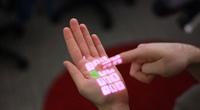-
"Printing" food with plant DNA to prevent counterfeiting
Branded foods from the waters off Japan are becoming popular in Asia; the growing popularity has lured counterfeiters into the market, where they sell common foods as the high-value brand, in the process destroying markets and reputation of the real item
-
-
L-3 acquires Detector Networks International
Last Friday L-3 Security & Detection Systems (SDS) announced that it had acquired Detector Networks International (DNI) in a move that bolsters L-3’s portfolio of radiation detection technology
-
-
New testing capabilities for bioterror threats
Research presented at the 13th Medical Biodefense Conference in Munich says that Abbott’s PLEX-ID system provides reliable and rapid results for key microbial biothreat agents and should be considered as a first line analytical tool for biodefense, biosecurity, and microbial forensics programs
-
-
Anthropomorphic robot testing chemical protection
Boston Dynamics is showing its PETMAN — an anthropomorphic robot for testing chemical protection clothing used by the U.S. Army
-
-
BVS helps U.K. prisons detect cell phones
Berkeley Varitronics Systems (BVS) has made quite a splash in recent weeks announcing a new partnership to distribute its cell phone detection technology in the United Kingdom, adding several options to its line of multi-band transmitters, and teaming up with Los Angeles Laker Andrew Goudelock
-
-
Laser Energetics delivers Dazer Laser GUARDIAN
Mercerville, New Jersey-based Laser Energetics, Inc. has announced the delivery of their Dazer Laser GUARDIANS; the initial delivery was made yesterday
-
-
Border security market booming
The border security market will reach a value of $17 billion in 2011, as governments around the world continue to invest in a range of border security products
-
-
Doing business with DHS
The climate for small and mid-sized companies is extremely competitive in the current congressional budget environment, for both technology and services firms — yet there are many opportunities for companies that know where to look and how to develop their strategy
-
-
Large rare earth deposit discovered near California mine
Molycorp Minerals recently announced that it had discovered significant deposits of heavy rare earth minerals near its mine in Mountain Pass, California and production could begin in as little as two years
-
-
SITA helps Indonesia track 20 million biometric identities
SITA, an international supplier of technology solutions for air transportation, is in the midst of helping Indonesia implement a biometric scanning system for all visiting foreigners; SITA’s BioThenticate can match and manage up to twenty million biometric identities and will be used to screen travelers against a biometric watch list using face and fingerprints
-
-
USAID, Swiss Re Partnership Targets Hunger, Natural Disasters
USAID and Swiss Re a few days ago announced a 3-year partnership to help vulnerable communities fight hunger, build resilience to climate change, and reduce the costs of natural disasters in the Americas, Africa, and Asia
-
-
New cloud continuity solution for SMBs
Research by Contingency Planning, Strategic Research Corp., and DTI/PricewaterhouseCoopers found that the effect of downtime and data and application loss on small to medium enterprises caused 70 percent of small firms to go out of business within a year of the event; a new cloud-based continuity service addresses this problem
-
-
Formation of Senate and House rare Earth minerals caucuses urged
The Association for Rare Earth yesterday urged the creation of Senate and House caucuses to focus on the challenges of securing supplies of rare Earth elements for U.S. high technology, clean energy, and defense communities
-
-
80% of U.S. small businesses have no cyber security policies in place
The majority of small business owners believe Internet security is critical to their success and that their companies are safe from ever increasing cyber security threats even as many fail to take fundamental precautions, according to a new survey of U.S. small businesses
-
-
OmniTouch turns any surface into a touch screen

Researchers at Microsoft and Carnegie Mellon have created a shoulder-mounted device that can turn virtually any surface into an interactive touch screen; with OmniTouch users can now use walls or even the palm of their hands to control their smartphones
-
- All
- Regional
- Water
- Biometrics
- Borders/Immig
- Business
- Cybersecurity
- Detection
- Disasters
- Government
- Infrastructure
- International
- Public health
- Public Safety
- Communication interoperabillity
- Emergency services
- Emergency medical services
- Fire
- First response
- IEDs
- Law Enforcement
- Law Enforcement Technology
- Military technology
- Nonlethal weapons
- Nuclear weapons
- Personal protection equipment
- Police
- Notification /alert systems
- Situational awareness
- Weapons systems
- Sci-Tech
- Sector Reports
- Surveillance
- Transportation
Advertising & Marketing: advertise@newswirepubs.com
Editorial: editor@newswirepubs.com
General: info@newswirepubs.com
2010-2011 © News Wire Publications, LLC News Wire Publications, LLC
220 Old Country Road | Suite 200 | Mineola | New York | 11501
Permissions and Policies
Editorial: editor@newswirepubs.com
General: info@newswirepubs.com
2010-2011 © News Wire Publications, LLC News Wire Publications, LLC
220 Old Country Road | Suite 200 | Mineola | New York | 11501
Permissions and Policies
